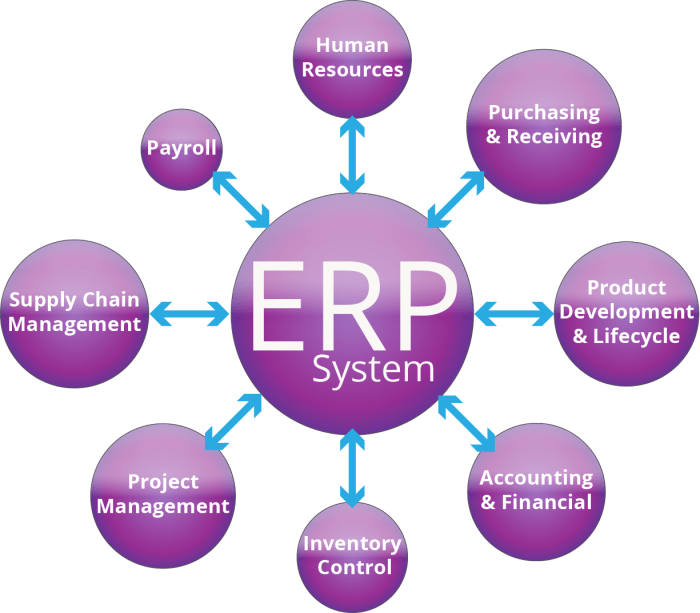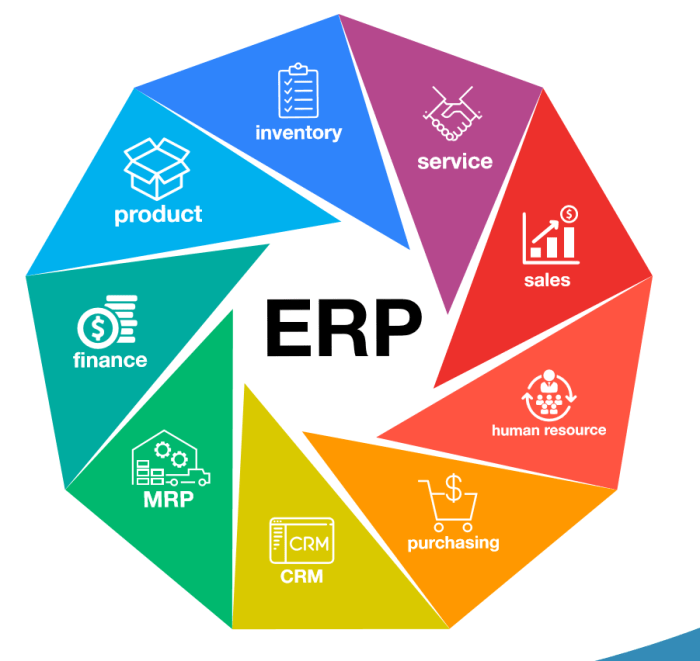ERP for Startup: Navigating the complexities of startup growth requires a robust system to manage operations, finances, and customer interactions. Enterprise Resource Planning (ERP) systems offer a centralized solution to streamline processes, improve data visibility, and enhance decision-making, ultimately driving efficiency and growth for startups.
This guide explores the crucial aspects of ERP for startups, covering the benefits, implementation, and its role in fostering success. We’ll delve into selecting the right ERP system, navigating the implementation process, and leveraging ERP for growth initiatives.
Implementing ERP in a Startup

Implementing an ERP system in a startup can be a game-changer, streamlining operations, improving efficiency, and providing valuable insights. However, it’s a complex process that requires careful planning, execution, and management.
Key Steps in ERP Implementation
The implementation process involves several key steps, from initial planning to go-live:
- Define Business Requirements: Clearly identify the specific needs and challenges that the ERP system is intended to address. This involves understanding current processes, pain points, and desired outcomes.
- Select the Right ERP System: Choose an ERP system that aligns with the startup’s size, industry, budget, and future growth plans. Consider factors like scalability, customization options, and integration capabilities.
- Plan and Design the Implementation: Develop a detailed implementation plan outlining timelines, resources, and key milestones. This includes defining data migration strategies, user training programs, and testing procedures.
- Data Migration and Integration: Migrate existing data from legacy systems into the new ERP system. Ensure data integrity and accuracy throughout the process. Integrate the ERP system with other critical business applications.
- User Training and Adoption: Provide comprehensive training to users on the new system, emphasizing its features, functionalities, and best practices. Encourage user adoption through effective communication, ongoing support, and change management strategies.
- Testing and Go-Live: Conduct thorough testing to ensure the system functions correctly and meets business requirements. Implement the ERP system in phases or a big bang approach, depending on the startup’s risk tolerance and operational needs.
- Post-Implementation Support: Provide ongoing support to users, address issues, and ensure the system remains optimized for the startup’s evolving needs. Continuously monitor system performance and make necessary adjustments.
Managing Change and User Adoption
Change management is crucial for successful ERP implementation. Strategies include:
- Communicate Effectively: Keep users informed throughout the implementation process, highlighting the benefits of the new system and addressing concerns. Use various communication channels, including emails, meetings, and online forums.
- Involve Key Stakeholders: Engage key stakeholders from different departments in the implementation process. This fosters ownership and promotes buy-in from users.
- Provide Training and Support: Offer comprehensive training programs tailored to different user roles. Provide ongoing support through dedicated help desks, user manuals, and online resources.
- Incentivize Adoption: Recognize and reward early adopters and users who actively contribute to the success of the ERP system. This encourages positive user behavior and promotes adoption.
Importance of Data Migration and Integration
Data migration and integration are critical aspects of ERP implementation. They ensure:
- Data Accuracy and Consistency: Migrating data accurately from legacy systems into the ERP system maintains data integrity and consistency, preventing errors and inconsistencies.
- Seamless Data Flow: Integration with existing systems allows data to flow seamlessly between applications, eliminating manual data entry and reducing errors.
- Improved Decision-Making: Accurate and integrated data provides a holistic view of business operations, enabling better decision-making based on real-time insights.
- Enhanced Efficiency: Automation of data processes through integration streamlines operations, reducing manual effort and improving overall efficiency.
Leveraging ERP for Growth

ERP systems can be a powerful tool for startups looking to scale their business and achieve sustainable growth. By automating business processes, providing data-driven insights, and enhancing customer service, ERP can help startups streamline operations, make informed decisions, and ultimately achieve their growth objectives.
Business Process Automation, ERP for Startup
Automating repetitive tasks and workflows can free up valuable time and resources for startups to focus on strategic initiatives. ERP systems can automate a wide range of processes, including:
- Order processing and fulfillment
- Inventory management
- Financial accounting and reporting
- Human resource management
- Customer relationship management
For example, an e-commerce startup can automate order processing and fulfillment with an ERP system, reducing manual errors and improving order accuracy. This allows the startup to focus on marketing and customer acquisition.
Data-Driven Decision-Making
ERP systems provide a centralized repository of data across different business functions, enabling startups to gain a comprehensive view of their operations. This data can be used to identify trends, analyze performance, and make informed decisions about resource allocation, product development, and marketing strategies.
- Sales performance analysis
- Inventory optimization
- Customer segmentation and targeting
- Financial forecasting and budgeting
For instance, a startup can use ERP data to analyze customer purchase history and identify patterns in buying behavior. This information can then be used to personalize marketing campaigns and increase customer engagement.
Improved Customer Service
ERP systems can improve customer service by providing a single view of customer interactions and enabling faster response times. With access to customer data, startups can personalize communication, address queries efficiently, and resolve issues promptly.
- Tracking customer interactions and support requests
- Providing personalized customer service
- Resolving issues quickly and efficiently
A startup can use ERP to track customer interactions, understand their needs, and provide personalized solutions. This can lead to increased customer satisfaction and loyalty.
Supporting Growth Initiatives
ERP systems can support various growth initiatives, including:
- Expanding into new markets: ERP can help startups manage operations in different regions, including currency conversion, language localization, and compliance requirements.
- Launching new products: ERP can facilitate the development, production, and distribution of new products, providing insights into market demand and supply chain management.
- Scaling operations: ERP can handle increased volume and complexity, providing a scalable platform to support growth and expansion.
For example, a startup expanding into a new market can use ERP to manage inventory levels, track sales performance, and adapt to local regulations.
Impact of ERP Modules
| Module | Impact on Business |
|---|---|
| Finance | Financial accounting, budgeting, forecasting, reporting, cash flow management, tax compliance |
| Operations | Inventory management, production planning, supply chain management, order fulfillment, quality control |
| Marketing | Customer relationship management, marketing automation, campaign management, sales forecasting, market research |
| Human Resources | Payroll, benefits administration, employee performance management, recruitment, training |
By understanding the core functionalities, choosing the right ERP system, and implementing it effectively, startups can harness the power of ERP to optimize operations, drive innovation, and achieve sustainable growth. ERP empowers startups to make data-driven decisions, enhance customer experiences, and gain a competitive edge in the dynamic market landscape.
Expert Answers: ERP For Startup
What are the key differences between ERP systems and standalone software solutions?
ERP systems provide an integrated suite of applications that manage various business functions, while standalone software solutions focus on specific tasks. ERP offers centralized data, better integration, and improved process efficiency, making it a more comprehensive solution for startups.
How can I determine the right ERP system for my startup’s specific needs?
Consider your industry, business size, budget, scalability requirements, and desired functionalities. Research different ERP vendors and compare their features, pricing models, and customer support.
What are the most common challenges faced during ERP implementation in startups?
Challenges include data migration, user adoption, change management, and integration with existing systems. Effective planning, communication, and training can mitigate these challenges.
How can I measure the success of my ERP implementation?
Track key performance indicators (KPIs) such as operational efficiency, cost reduction, customer satisfaction, and revenue growth. Analyze data to identify areas for improvement and optimize ERP usage.